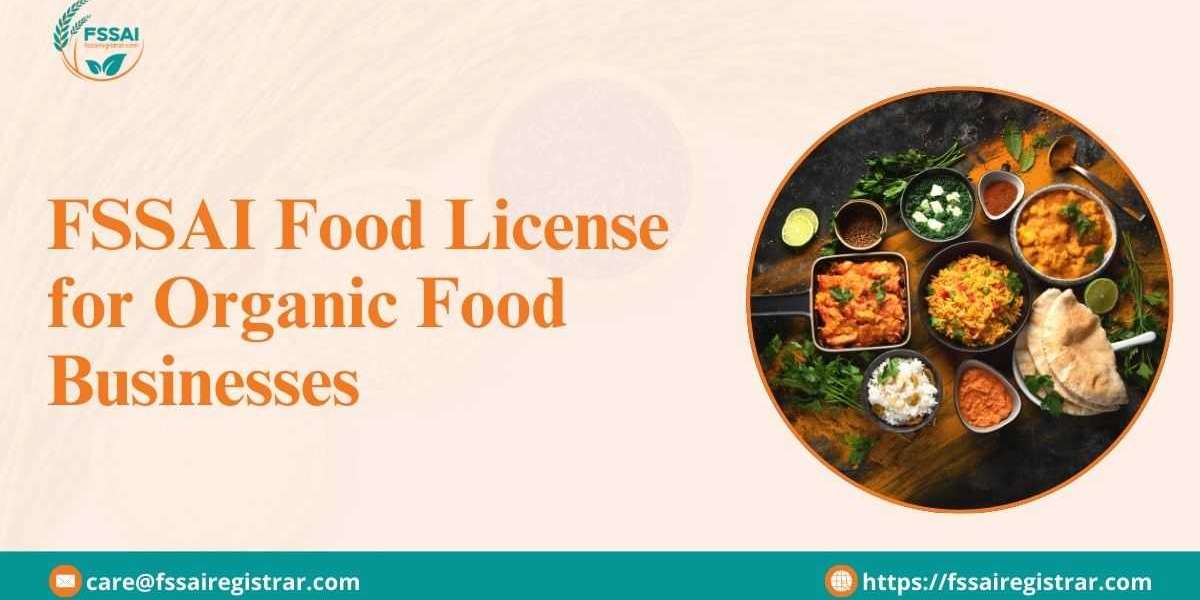The demand for organic food is growing rapidly in India as people are becoming more health-conscious and prefer chemical-free, natural food products. However, to legally sell organic food, businesses must obtain an FSSAI Food License.
The Food Safety and Standards Authority of India (FSSAI) ensures that organic food businesses maintain quality standards, safety regulations, and proper labeling. If you own an organic food business, getting an FSSAI license is necessary for legal compliance, customer trust, and business expansion.
This guide explains why an FSSAI Registration is important for organic food businesses, eligibility criteria, types of licenses, required documents, the step-by-step application process, and benefits.
What is an FSSAI License for Organic Food Businesses?
An FSSAI food license is an official certification from the Food Safety and Standards Authority of India (FSSAI) that allows organic food businesses to operate legally. It ensures that food products meet organic standards and safety guidelines.
The FSSAI license is required for:
- Organic food producers and farmers
- Organic food manufacturers and processors
- Packaged organic food sellers
- Wholesalers and distributors of organic food
- Retail stores and supermarkets selling organic food
- E-commerce organic food businesses
Having an FSSAI license protects consumer health, ensures food authenticity, and builds brand credibility in the organic food market.
Why is an FSSAI License Important for Organic Food Businesses?
Legal Requirement for Organic Food Businesses
An FSSAI license is a mandatory requirement for all food businesses, including those dealing with organic products. The Food Safety and Standards Authority of India (FSSAI) regulates and monitors food businesses to ensure that they comply with food safety norms. Without an FSSAI license, selling organic food in the market can lead to legal consequences, including penalties and business closure. Registering under FSSAI ensures that your organic food business operates legally without any risks of violations.
Ensures Food Safety and Quality Standards
Organic food businesses must adhere to strict food safety regulations. The FSSAI license guarantees that the products meet the necessary safety standards, making them safe for consumption. It involves regular checks on ingredients, processing, and packaging to ensure that food remains free from contamination. This license ensures that organic food is genuinely safe, chemical-free, and produced using natural methods, maintaining the integrity of organic certification.
Builds Consumer Trust and Confidence
Consumers today are more aware and cautious about what they eat, especially when it comes to organic food. An FSSAI license serves as proof that the business follows strict quality control measures, reassuring customers about the authenticity of organic products. When a brand has an FSSAI license, customers feel more confident purchasing from it, knowing that the food has undergone the necessary safety and quality checks.
Enhances Market Credibility and Brand Reputation
Having an FSSAI license adds credibility to an organic food business. It signals that the company is committed to maintaining high food safety standards. Businesses with proper certification have better chances of being accepted in supermarkets, retail stores, and online marketplaces. It also opens opportunities for collaborations with bigger food brands and suppliers, increasing the overall reputation of the business.
Essential for Organic Certification Approval
To obtain organic food certifications like Jaivik Bharat and India Organic, businesses must first have an FSSAI license. This license acts as the foundation for further organic verification, helping businesses prove their authenticity in the organic food industry. Without an FSSAI license, organic food producers might struggle to gain recognition and approval for their products in the regulated organic food market.
Supports Business Expansion and Growth
A registered organic food business can easily expand into new markets. Many large distributors, supermarkets, and wholesalers require businesses to have an FSSAI license before listing their products. With a valid food license, organic food manufacturers and sellers can expand their reach to multiple locations, enter bigger markets, and increase their customer base.
Types of FSSAI Licenses for Organic Food Businesses
FSSAI licenses are categorized based on business size and annual turnover.
A. FSSAI Basic Registration
- For small organic food businesses
- Annual turnover below ₹12 lakh
- Suitable for small farmers, home-based sellers, and organic food startups
B. FSSAI State License
- For medium-sized organic food businesses
- Annual turnover between ₹12 lakh and ₹20 crore
- Required for organic food manufacturers, processors, and wholesalers
C. FSSAI Central License
- For large organic food businesses
- Annual turnover above ₹20 crore
- Needed for exporters, importers, and businesses operating in multiple states
Choosing the right license type ensures legal compliance and smooth business operations.
Who Needs an FSSAI License for Organic Food?
Any business dealing with organic food production, processing, storage, distribution, or retail must obtain an FSSAI license. This includes:
- Organic farmers and producer groups
- Organic food brands and packaging units
- Organic food wholesalers and distributors
- Retailers and supermarkets selling organic food
- Online organic food sellers and marketplaces
- Organic food importers and exporters
Even home-based organic food businesses must obtain an FSSAI Basic Registration to operate legally.
Documents Required for FSSAI License
A. For FSSAI Basic Registration
- Aadhaar Card or Voter ID (Identity proof)
- Business Address Proof (Electricity Bill or Rent Agreement)
- Passport-size Photograph
B. For FSSAI State and Central License
- Company Registration Certificate (If applicable)
- PAN Card of Business or Owner
- GST Registration (if applicable)
- Food Safety Management System (FSMS) Plan
- List of Organic Food Products to be Sold
- Source of Raw Materials (For organic food manufacturers)
- Import Export Code (IEC) (For exporters)
- NOC from Municipality or Local Authority
- Organic Certification (If applicable)
Step-by-Step Process to Get an FSSAI License for an Organic Food Business
- Visit the Official Website – Go to the FSSAI registration portal through your browser.
- Fill Out the Application – Provide your name, business details, and food category, and upload the required documents, including your PAN card.
- Review and Submit – Double-check all the entered details for accuracy before submitting the form.
- Make the Payment – Pay the applicable registration fee online based on your license type.
- Verify OTP – Enter the One-Time Password (OTP) received on your registered mobile number or email for verification.
- Site Inspection (If Required) – Food safety officials may conduct an inspection of your premises before approval.
- Download Your License – Once approved, log in to the portal and download your FSSAI registration certificate.
Conclusion
Getting an FSSAI license is essential for any organic food business to operate legally and build customer trust. It ensures food safety, quality assurance, and business growth opportunities.
By following the right registration process, maintaining hygiene standards, and complying with organic food regulations, businesses can expand, sell nationwide, and even enter international markets.
Whether you are a small organic farmer, food processor, wholesaler, retailer, or online seller, obtaining an FSSAI license will help you grow and succeed in the organic food industry.








